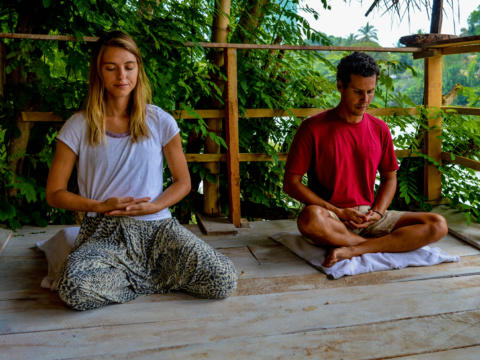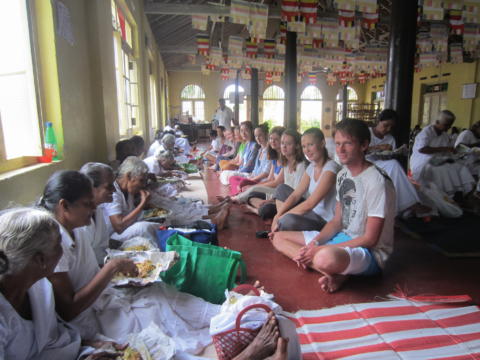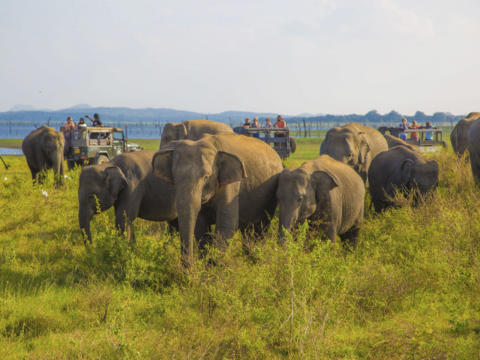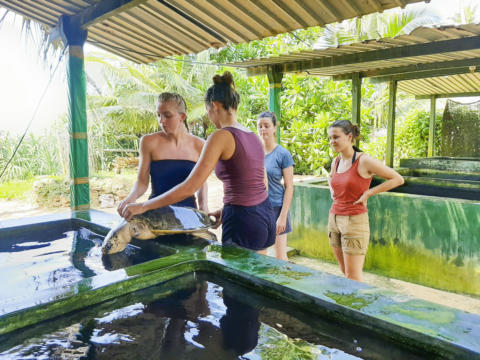Only 540€ per week!
Wild Elephant Conservation
Wasgamuwa, Kandy and Ambalangoda - Sri Lanka
Join our efforts in the conservation of wild elephants of Sri Lanka and get yourself involved in research, observation, and many other activities!
This program aims to assist in developing conservation strategies to help conserve elephants, leopards, other wildlife and their habitats in the Central and North Central Provinces of Sri Lanka. You will also get a chance to work at our turtle rehabilitation centre.
Living
Surroundings
Program Description
This program is a 4-week program. On your first 3 weeks Wasgamuwa you will be observing and documenting the activities of elephants in the wilds of Sri Lanka. On the fourth week, you will be at our turtle conservation project, looking after endangered sea turtles that are unable to survive in the wild due to illness, injuries etc. and also you will have an opportunity to live by the blue ocean.
You will spend 3 weeks in Wasgamuwa observing and researching the behaviour of wild elephants, assessing human-elephant conflicts, biodiversity mapping using surveying techniques, community-integrated human-elephant conflict resolution, monitoring electric fences, and sustainable rural livelihood development programs. Participants also learn about using GPS, remote sensing and GIS techniques to develop conservation strategies to help conserve elephants, leopards, other wildlife and their habitats in the Central and North Central Provinces of Sri Lanka.
On the wild elephant conservation project, you will enjoy the experiences of:
- Observing the behaviour of wild elephants, birds and other wildlife from the Tree Huts and field vehicles and
- While Trekking, you will observe wildlife & birds, look for leopard & elephant signs, observe various habitats, and visit forest hermitages
- Bird watching and generally observing and enjoying nature around the Field House.
- You will work assisting with elephant research, you will be utilising many tools during your stay, including GPS, remote sensing and GIS techniques, also biodiversity mapping using various surveying techniques. All aimed at developing strategies to help conserve elephants, leopards and other wildlife in their natural habitats in the surrounding area.
- Lastly, you will become actively involved in helping the local community assessing human and elephant interaction which often includes involvement with conflict resolution, monitoring electric fences which are erected to stop elephants from raiding crops and village homes
- Visit the Weheragala village to observe a human-elephant conflict resolution project, meet and discuss the issues and challenges with community leaders and villagers all aimed at sustainable rural development and conservation.
These activities will occupy your 3 weeks working with these wonderful creatures.
The 4th week of the project will be spent at our Turtle Conservation project at Ambalangoda. This project rescues and rehabilitates endangered sea turtles and also aids nesting and carries out other conservation-related activities. You will be transferred (by bus or train) to Ambalangoda, a small Sri Lankan town situated next to the blue waters of the Indian Ocean in the Bay of Bengal with pure white sandy beaches, a perfect way to end your stay in Sri Lanka. Here you will participate in our Turtle Conservation Project.
Aims & Objectives
This project is aimed at developing strategies to help conserve wild elephants, leopards and other wildlife in their natural habitats in Wasgamuwa and also to be actively involved in helping the local community.
Schedule
Week 1: Wild Elephant Research & Conservation
Sunday (Kandy)
If you arrive on time on Sunday, you will be transferred to Wasgamuwa on the same day. If not you will arrive at our accommodation in Kandy from the airport and relax.
Monday (Wasgamuwa)
On Monday you will leave to Wasgamuwa. This day is mainly occupied by travelling from Kandy to Wasgamuwa.
You will be leaving the Wild Elephant Research & Conservation project early morning by public transport (bus). One of the coordinators in Kandy will accompany you to the bus station and will give the necessary information to the bus conductor regarding the drop-off. Even though you will be travelling alone by bus or with other participants who are leaving for the same project, a coordinator from the Wild Elephant Research & Conservation project will be there at the other end to pick you up from the bus station.
Please note that you are transferred to the project only on Monday early morning as there is only one bus leaving to this area per day. The journey takes approximately five hours.
Tuesday to Friday (Wasgamuwa)
Your daily activities at the Wild Elephant Research & Conservation project in Wasgamuwa will be:
- Assisting with elephant research, biodiversity mapping using various survey techniques, assessing human and elephant interaction which often includes involvement with conflict resolution, monitoring electric fences which are erected to stop elephants from raiding crops and village homes.
- Observe projects established to as a resolution for human-elephant conflicts, meet and discuss the issues and challenges with community leaders and villagers all aimed at sustainable rural development and conservation.
- You will also assist with monitoring remote camera traps and sand traps that have set up to gather information on leopards, sloth bears and various other carnivores and small wild animals.
Saturday (Wasgamuwa)
This is free time for you to travel and explore.
Week 2: Wild Elephant Research & Conservation
Sunday (Wasgamuwa)
This is free time for you to travel and explore.
Monday to Friday (Wasgamuwa)
Your daily activities at the Wild Elephant Research & Conservation project in Wasgamuwa will be:
- Assisting with elephant research
- Biodiversity mapping using various surveying techniques
- Assessing human and elephant interaction which often includes involvement with conflict resolution
- Monitoring electric fences which are erected to stop elephants from raiding crops and village homes
- Observe human-elephant conflict resolution projects
- Meet and discuss the issues and challenges with community leaders and villagers all aimed at sustainable rural development and conservation
- You will also assist with monitoring remote camera traps and sand traps that have set up to gather information on leopards, sloth bears and various other carnivores and small wild animals
Saturday (Wasgamuwa)
This is free time for you to travel and explore.
Week 3: Wild Elephant Sanctuary
Sunday (Wasgamuwa)
This is free time for you to travel and explore.
Monday to Friday (Wasgamuwa)
Your daily activities at the Wild Elephant Research & Conservation project in Wasgamuwa will be:
- Assisting with elephant research
- Biodiversity mapping using various surveying techniques
- Assessing human and elephant interaction which often includes involvement with conflict resolution
- Monitoring electric fences which are erected to stop elephants from raiding crops and village homes
- Observe human-elephant conflict resolution projects
- Meet and discuss the issues and challenges with community leaders and villagers all aimed at sustainable rural development and conservation
- You will also assist with monitoring remote camera traps and sand traps that have set up to gather information on leopards, sloth bears and various other carnivores and small wild animals
Saturday (Kandy)
Travel back to Kandy by bus and spend the night at our accommodation there.
Week 4: Turtle Conservation
Sunday (Ambalangoda)
Depart from Kandy to Ambalangoda by train at 16.30. A coordinator will be at the Ambalangoda railway station to pick you up.
Monday to Friday (Ambalangoda)
At the turtle conservation centre in Ambalangoda, the following activities may change according to the beach weather conditions and the number of participants but the time spent with these marvellous creatures is the main aim of our participants’ involvement.
This program requires hardworking and willing to support in the cleaning of the turtles, the tanks and the turtle conservation centre. It is vital to have a clean and hygienic centre for these animals. Typical activities during the week will include:
- Feeding the turtles (every other day)
- Maintenance of the turtle tanks
- Cleaning the turtles
- Cleaning and maintaining the beach
- Helping with the release of new-born turtles into the ocean.
Note: This schedule can be changed and/or amended depending on weather conditions, local conditions and unforeseen circumstances.
Participant Criteria & Requirements
Standard Requirements
Minimum age: 18
Maximum age: –
Minimum English level: Basic
CRB required: On Signup
Passport copy required: On Signup
Resume copy required: No
Required qualification: None
Additional Requirements
- Participants above the age of 65 should have medical clearance.
Additional Equipment
- Shoes suitable for hiking
- Insect repellent
- Appropriate clothing for hiking and trekking
Location
Wasgamuwa is a rural area covered with untouched habitats and forests. The closest cities to this small town are Kandy, Mahiyanganaya and Dambulla. Wasgamuwa has become popular among both locals and foreigners mainly due to the Wasgamuwa National Park where there is plenty of wildlife. This area is also important for its rich biodiversity.
About the Accommodation
Since this is located in a forest area, wifi is not available. However, provided that you have a local SIM card with an internet connection and a smartphone, you will be able to communicate with your loved ones.
The participant accommodation is located in the periphery of a small forest and a village. The accommodation is a built-in dormitory style to maximize interaction among participants. You will also have to share the available bathrooms with other participants.
Furthermore, there is a refrigerator, in which you are welcome to use to store food and beverages.
Food Arrangements
You will be provided with three meals a day. The meals are Sri Lankan food, consisting mainly of vegetarian dishes including rice and vegetables with western embellishments.
Facilities
ATMs and a supermarket are available at the Hettipola Town which is 20 minutes from the Field House by vehicle. The selection of items at the stores in town can be limited therefore, we highly recommend that you bring cash necessary for your spending and other items you may think necessary for your use before you leave Kandy.
Activities & Events
No scheduled activities outside the program.
Sights & Surroundings
The suggested sights and surroundings to visit while you are in Wasgamuwa are;
- Dambana – One of the traditional villages of the indigenous people of Sri Lanka known as the Veddhas.
- The Wasgamuwa National Park, which is rich in biodiversity and a major attraction for local and international tourists.
- Two other popular destinations among the participants of the project are Ratna Ella waterfall and the Knuckles Mountains.
Transportation
From this location we do not provide free transport to other locations.
Location
Kandy, the last royal capital of Sri Lanka is a major tourist destination. About 115 km from Colombo at 465 meters above sea level. Famous for the Temple of the Tooth and many other temples the city could be called the cultural capital of the island. This bustling market town is rich in cultural diversity and has plenty to offer to the tourists from songs dances and handicrafts to ancient temples and adventure activities. Kandy was a royal capital and the last stronghold of the Kandyan kings against foreign powers, holding out against them for about 300 years. The two main Buddhist Chapters are based here and formed the last center of independent Buddhist thought during colonial times.
About the Accommodation
You will be accommodated in one of our centers which are located 2-4 kilometers away from Kandy center. Furthermore, there is a refrigerator which you are welcome to use to store food and beverages.
Food Arrangements
You will be provided with three meals a day on weekdays and two meals per day on weekends. The meals are a mix of Western and Sri Lankan food, consisting mainly of vegetarian dishes including rice and vegetables. You can also eat out at any of the local restaurants.
Facilities
Our house is located 2 kilometers away from the city center, where you can find anything you might need.
The nearest ATM and supermarket are a 15-minute walk away from our accommodation.
Activities & Events
No scheduled activities outside the program.
Sights & Surroundings
The places to visit during your weekends or on your project holidays are the Royal Botanical Gardens, Knuckles mountain range, Udawatta Kele sanctuary, Hortons plains national park and the railway museum.
Transportation
From this location we do not provide free transport to other locations.
Location
Ambalangoda is a coastal town located in the Galle District, of the Southern Province of Sri Lanka. This little town by the ocean is a sweaty, workaday town, and not touristy. Ambalangoda is known as a Buddhist city in Sri lanka. Ambalangoda is the place where "Masks" originated in Sri Lanka during the days of the kings and this is still thriving sometimes but a bit modernized. In addition the place is reputed for its golden beaches, puppet shows, devil dancing, moonstone, and antique furniture. Plantations of low country tea, rubber, coconut and cinnamon plantations and factories.
About the Accommodation
You will be accommodated in our center which is located a few meters from the ocean.
The beach is closer to the accommodation where you can hang out with fellow participants.
Furthermore, there is a refrigerator which you are welcome to use to store food and beverages. Safety lockers are available to store your belongings. Please bring your own padlock to be used.
Food Arrangements
You will be provided with three meals a day on weekdays and two meals per day on weekends. The meals are mainly Sri Lankan food, consisting mainly of vegetarian dishes including rice and vegetables. You can eat out at any of the local restaurants.
Facilities
Our house is located a 10 minutes walk away from the city center, where you can find anything you might need.
The nearest ATM and supermarket are located a 10 minute walk away from our accommodation.
Activities & Events
No scheduled activities outside the program.
Sights & Surroundings
Visit the Sailatalarama Vihara which lies about 7 km inland from Ambalangoda. This temple sits on a domed hill with broad views over spice plantations and lakes towards the ranges of the Province of Sabaragamuwa. The temple has a 35m-long sleeping Buddha statue, built by donations. Pilgrims approach the dagobas and devale (a complex designed for worshipping a Hindu or local Sri Lankan deity) via 208 steps, but there’s also a road to the top.
Also visit The Ariyapala Mask Museum, with its dioramas and explanations in English, they give an excellent insight into Sri Lankan masks and the meanings behind them. It also sells the booklet The Ambalangoda Mask Museum, a useful publication if you want to delve into the mysterious world of dance, legend and exorcism, and the psychology behind the masks.
Transportation
From this location we do not provide free transport to other locations.
Quick Facts
Name: Democratic Socialist Republic of Sri Lanka
Population: 20 million
Capital: Sri Jayawardenepura Kotte and Colombo
Language: Sinhalese, Tamil
Currency: Sri Lankan Rupee (LKR)
Time zone: UTC +5:30
Country Information
Sri Lanka’s over 2000 years of history and culture can still be seen in every corner of its cities and the details of its ever-beautiful ancient temples. With eight UNESCO World Heritage sites and its short distances between the main sights, Sri Lanka is a country that, despite often being overlooked in itineraries, has left travelers filled with awe.
Visit the sacred home of the world’s oldest living tree in Anuradhapura, wander around the colonial architecture of Colombo, get sun-kissed at the untouched beaches that enclose the territory, snorkel in the crystal-clear waters, head to the hills for a cooler temperature and get surrounded by lush natural vegetation, visit two thousand year-old temples or get overawed at the sight of hundreds of elephants in Minneriya.
While traveling through Sri Lanka you will experience adventures from the highest and chilliest mountains like the famous Adam’s Peak – a stairway mountain considered sacred in three different religions, through the elephant shelters, to the most peaceful beaches up north near Trincomalee and their tiny- one floor- hostels facing the calm sea.
Climate
Sri Lanka is one of the best destinations to visit year-round as the rainy seasons hit the island in opposite locations at different times of the year. That being said, Sri Lanka is a country that can be visited if you know where to go in search for the best weather.
Southwest
The southwest monsoon hits between May and September and the dry season occurs from December to March.
North and coastal regions
The monsoon season happens between October and January while the dry seasons takes places between May and September.
Culture
Sri Lanka is known for its distinct cuisine, indigenous holistic medicines, cricket practices and prestigious export of tea, cinnamon and gemstones. Moreover, the country boasts of a rich artistic tradition which includes music, dance and the visual arts.
Sri Lanka has been shaped by many aspects. The first and most obvious being the heritage of Theravada Buddhism passed on from India. Furthermore, the colonial period left a big mark in the country’s traditions and culture, with British elements being featured in every corner as well as Dutch and Portuguese elements.
Sri Lanka, better known as the “nation of smiling people”, is a paradisiac island that Napoleon described as a world-like biodiversity in a tiny piece of land on the Indian ocean. Multicultural, multi-religious and multi-coloured country, formerly named Ceylon, is known for its delicious black tea, it’s heartwarming inhabitants and its history-filled corners.
The festival of Duruthu celebrates the Buddha’s first visit to Sri Lanka. During Duruthu, thousands of people attend colorful parades, which consist of three processions on the nights before the full moon. The processions consist of fireball performers, drummers, dancers, decorated elephants and the most important – a gigantic tusker treading a white carpet.
On April 13th or 14th Avurudda celebrates the Sinhalese New Year. According to Sinhalese astrology, the new year begins when the sun changes from Meena Rashi (Pisces) to Mesha Rashi (Aries).
During June the Poson Festival takes place on the full moon day of June and celebrates the arrival of Buddhism, which occurred when Arahat Mahinda, the son of the emperor of India, converted King Devanampiyatissa to Buddhism.
During October or November, Diwali the Festival of Lights is celebrated. Diwali is an ancient Hindu festival that signifies the victory of light over darkness, knowledge over ignorance, hope over despair, and good over evil. It is celebrated with millions of lights shining over houses, temples, and buildings. Diwali is celebrated between mid-October and mid-November, on the darkest, new moon night of Karitika.
In Sri Lanka, it is tradition to take an oil bath in the morning, wear new clothes, exchange presents and sweets and visit the Koil, a Hindu Temple. In the evenings, oil lamps are lit to invite the blessings from the goddess of wealth.
Transportation
Plane
Flying between major locations in Sri Lanka such as Galle, Colombo, Nuwara Eliya and others is possible with Aero Lanka and Srilankan Airlines. Moreover, Srilankan Airlines runs small seaplanes, which give you a great aerial view of the island.
Bus
Buses are a option to get around Sri Lanka, albeit quite uncomfortable. For instance, for less than a Euro you can get almost halfway around the island in a bus without air conditioning. Luxury buses with air conditioning also exist at a higher price which are still very inexpensive.
Train
Sri Lanka boasts of an extensive railway system that will get you almost anywhere around the country. Moreover, Sri Lanka is known for its picturesque scenery that can be best viewed in a train journey. In fact, there are observation carts in most trains for tourists that will allow you to better take in the beauty of your surroundings.
In most cases, getting around by train is the cheapest option. There are three classes: 1st, 2nd and 3rd class. In most Intercity and Express trains, however, only 1st and 2nd are offered. Do keep in mind that trains from one popular destination to another (i.e. Colombo – Kandy or Galle – Colombo) often get overbooked, so it is best to reserve a seat much in advance.





